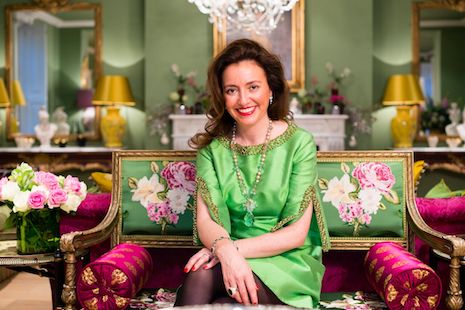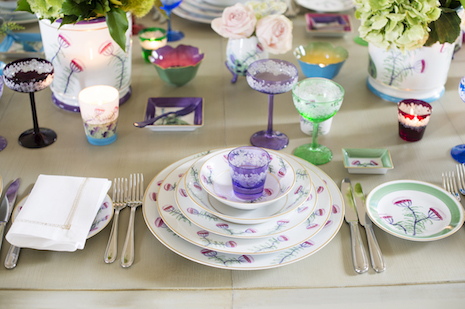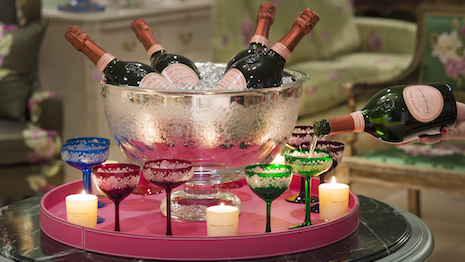British home furnishings brand Rachel Bates is taking a made-to-order, interior design-style approach to decór that is simultaneously personal and positive for the environment.
After establishing an interior design business, Ms. Bates founded her eponymous home furnishings brand seven years ago. As more attention is drawn to sustainability as well as the people behind products, the company is focused on creating pieces that provide a positive impact and will stand the test of time.
“I want to create beautiful pieces that become the antiques of tomorrow,” said Ms. Bates.
Interior design
While Ms. Bates used to say that she got into the interior business by accident, today she believes that everything led her to this career path.
After working at Good Housekeeping magazine and her family’s construction business, overseeing the rebuilding of her home led to requests from friends for interior design help. This experience then lent itself to launching an online interiors platform.

Rachel Bates. Image courtesy of Rachel Bates
Despite having some wholesale partnerships, the majority of the business is direct-to-consumer online. This approach has enabled the company to reach consumers around the globe.
One of the key markets for the brand is the United States, with consumers discovering the company through online searches or word of mouth. Today the U.S. makes up about half of the company's online business.
Providing a human touch, products are made to order via a concierge, allowing consumers to pick a precise fabric, wood or hue.
The designer says she sees color making a comeback in home design.
When Ms. Bates established her company, she used color as a differentiator. While her crystal pieces come in more typical clear variations, to-date the brand has only sold one set of clear crystal.

Rachel Bates china. Image courtesy of Rachel Bates
Helping to execute this made-to-order offering are artisans around the globe. Crystal is produced in the Czech Republic using 200-year-old techniques, while porcelain is made in France and rugs are created by Hong Kong-based Tai Ping.
In the brand’s home country, craftspeople make paint and furniture.
One of the focuses of the business is creating luxury that does not have a cost to those who produce it.
Even with this sustainable approach to the supply chain, products in the collection offer a range of price points, a strategy designed to allow more aspirational consumers to buy into Ms. Bates’ version of luxury. For instance, a shopper with a more limited budget may invest in a single Champagne glass, while those with a bigger wallet have the funds for a wine cooler, priced beyond $18,000.
Often fine china and formal living rooms are set aside for special occasions, but Ms. Bates is a proponent of not being scared to use the finer things on a day-to-day. This could mean enjoying a nightly drink in crystal flatware or taking.
Moving into a new category, Ms. Bates is collaborating with a New York jeweler to produce a line of pieces for both the person and the home. This is part of a push into more lifestyle categories, while retaining the focus on artisanship and luxury at varying levels of accessibility.
Positive impact
Three years ago, Rachel Bates Interiors earned Positive Luxury’s Butterfly Mark, an indicator that the label operates in a way that takes both people and the environment to heart.
As the brand is seeking out new partnerships, it looks to make sure that the producers it is partnering with display positive practices.
Another pillar of its approach revolves around giving back through a partnership with charity Smart Works.
According to Ms. Bates, a lot of the current issues with sustainability are related to overproduction. Consumers are able to be materialistic since product is readily available to them.
British department store Harrods worked with streetwear label Vetements to draw attention to the issue of overproduction.
The Zurich-based brand has taken over four of Harrods’ windows for an installation that showcases how much fashion is wasted. While potentially a counter-intuitive message for a brand and retailer, the project aims to inspire a more sustainable fashion strategy (see story).
“If everyone went back to a system of made-to-order, the world would be a better place,” Ms. Bates said.
{"ct":"XqpRHMUzCPxDIN1J665v0UM\/JNW1shXJlCy4nDyMBf13B5ToVtyxj9+WyLjDoArVKPNUIuU3jlEUEv5CWccQLcZeukBJlfCwmN0ge\/MI7Ai6XmbQhfQmBxfDjHnTcxj5A5\/KrDM\/NcDyfPJI48DwmaugNr7jtinioL+nUj7OK9Vu0O2fMBjSL0wX22VqdUWVGreKzZpyeMeprdjWKFPfXaQCBdbEb0Pu4RHoudSCzMIhWuveERUxj5mFSSOF5zSxNoSqtOYgRRIeqAO2JeRf1P0obHL2JFAk60sUopWSVIwFCKIrS\/6KoAqZPDsRvFn\/SzOItCpEqXNGss20iB2rziMlnaWnoqvuI6X9JjzxLazIHDe4R\/Tesf+zUjyclE4ybiS+RsheN\/gJhoGl7fcy\/iwvwDp9bF3BjVraEBlscg1A\/lR7dB4oCvO2bpexeVBRF+KL\/02IgJ9xn4q+rVTFFmzYJc5pFqR0NclYjMipRrQ+YdBQgeJZpgxHsI7rTnPsb3qrLvzGx5lrxX7y8mP3qlQqhiYHRfnOUC89D8Hiix40xjGqQEsKb1Hl3eLxBtH5tX3p9FW7kyqkQrPTIjzRgrTGTSk8iTHNT4XAfFtc2Os\/9q9iwWJQNGPyxwL7x\/2ZTAnGXCt3N8jyUJyn0uIh\/MJfQGHL84dwdU7w3M1bD1XAsVYpUQvhFtRJ6y2aEZ1e94ILe0Txtv5BIs2WEfdTEGSh7DD57klpAL067jX8fqc+azp60Q0FB2ynOkvOZ6klT1q1A0xOsqMcSsu8BeKtzOziRIts\/pu1\/NM\/fcp6V6EOW+WnOyZ4SXm8DCKfpq9+ZFJMySVfT6Gz3vS2PXU6eRbE9nlPOtilZvjP9N1kxthJTe8Voz0LogYCrjux7FGo7oeqXdeB\/G75w8EnlTODQp+rWy+1NigypsWOFhPCuXcroFayOFx5gxGgzvWxMnbGWiJkMatCE1fDrdTCmBe0fD5N4+YuMMXCg1o0D5LQGWh4EcOub9h6VNU5SbPI8UbSpww4MmsKOfLWyaP1Y4ecFJGs6Dd3fxCbmpBXw8PZgwgEjyKa\/GW5TfgPouxE8THyuYsIWSlPWp+ODt58YRfaJuCtgc3z8JSf37qxHEQ\/wuhjs9NSFl4KWF+raSMF5uXqM7yLLNRa+LDXlYqhkj\/nHoWsrSazT8E3CAcVYSH\/1WFGS+cvpR+a6pMdJYOghoWCktk1TYDmbXNC5nUo\/T3\/mUmEACpyNhgn1JNBP93RACu6lHWs\/4wRCEi9oGh0FcuBj28Xl+7obtSuO2rV5TqYGYYd97Q+ERRnnBNJkKuHVytecvXUrem8nB8Yjc5d6jBpx6mx8SsLOqeZYFTQOZGGAFdEqPbkYX0UYCmjdpFiagSg4QKAZgREn5aKbIHYWhP58B1vC9rjYpIkgc6d9iqOL4p3AkKbPe8y8BKw5Se\/pMfO31sy\/0SbLcOOsoBGOb2MYuEFsyAvWZCvokmJfbbJGDAiglKCzsKAKtzoi5quvWIUkrCoIWjavCOh0Dz0Hv4UO+8cXuQXMAWVenvhDYXxBSwO5SEWbTdUueYJOAG\/PFUSlBZleqoySMiSNlY8LZwltZxHpRLMePSX1k0FIy09uQtwpASMCLxuyXqMyHLQZtQnt+iKPNvOOfq6gA3tyoDV2vHRfHNRhYRwcOj3gx8Uji4gSxOtC5ywFiPz3ABbrKAW0+\/D5NgI4UiLgViYvCoUOaYRODTWkpdhODqpTel\/eXdqXeLNe8j9aNT58wvvkutLBs4LjkkRpmoeUwynIHmdh5x+wqcvTd98QQmC\/HivhooONvaKuMK+46z8fIzKhwLPoa0WhbpqdV9\/8p3B5Ipiuc8exU+hQ8iJnfPBB8vdd0mqFssyBGY\/9pmJZKuMKi4ovRLgU6zsgHetNc8\/\/IZ9t25H02hp+1E3AGNBtqTA4qRKZ9DRHNO6+5p2Gu1VHKNYTGBLoqcXvc2SDYDMYR8ddlpckUz2TpknxTYWyFCqEbciYxq1Fs5\/VJVtaPAhE4bupDP3rIsZZWaT675Zk0Op\/Y6\/nBbL1HFA8dhnUJSR8y\/XQxhapZAV7JHqVIxyEjztNjmTWyAq8cOTVW8z+E4beEq+FAVtuQpvFSzR\/SECG21M4dfWB7MlsyXGiR5wBjXPdRwf06q6r3HXpbdjV0oDyqN4HkJsFEfoT0joBzAHNoqc4JeUQkHbv3AAQNpT1WqC2+DrmeynL9OmpL0OkmghFo00+c+Veq2TDrg5GrfzBbEUFLbRtcKTO3KVOqlFV7N5jCN09\/TB12C2DBBVAOCj1PEAvME\/lQsnvlhYnHIjyLFAXQL94mmoQzegF08GMw\/br\/l2tDyEDSs6HhICgY1AXynWfAZs2srOmziJaAPw9z1OKJt829t2fMjglsm18O\/h9Zc42a5oNYvAaPyxPPiaUlvLJ7U+rAP6AmIufC5dsXNkgdwk8jcz32KXNidqOfYfD+baRDoccb\/sCGRXouzNuf6PZzQJhfOqmy\/QHgEv\/RPR1ZK2jKq\/t+3VrHI+qsZDlmcJX9CjiBR2K7OlP9YsJj5rm7chQVH\/Wrrm6qkwv9NjPCSeqpFx+z3RNThM5GIVyJzkHtswULZgHiFRJg5h4yhfYd2VZZWqKhpS2uDT46Rg1C0Ho1b4F74LAcu9EAUrIR4pxtXqeno09MTLJL8L4694+Nkqn6uaf4pk\/hmc7dCnO50l\/pt5lxTIePIBdbl15B5SbrWsbfuKC0UqDToA6ARREVB0ciKhfIwAtuRpdUtSgZXhK7XE8Bh13+51th\/MCSmbAX2LRtciEu6oIzCBDv+jO\/aSzHsA1VyKTf1GTw5QmNJU8tkCZnp0MO733R2EeaPryzy6HRiEs1ZUcQ8ktaPYs7glWOzbxUmCDFMCkuQbP+\/xcTnjMWu+8zXUEn0C5WsUuA54VbCGE\/Feq+1jIrFuHxRrGoTPpw1NLQ5+8LH\/qAkciwPTXlECiqeC20n7TewGz4O5bcBRr4OhUxxrF1w39nVfsrodC3EbQEJsh1zz+5i\/5zbaqeRc4rzjjyPAAfcMksPx0XpQvknxK0kToxxMr2IG5lihS4Qw+gxSJ4GtCKTVoNLVPlaTLlTVGFnas5A6bDGigB8Wsm3VhmQlN5RjtFTuP0iU+ubRpKBiyU\/N9Mihh+DyAAxtsW3VyDEN27M59hf+LxypaMOyHrKRVX+Xg\/W6lHo1ugt0hE1PhhDa1N0xyI5QDPvWPMZWWoow3eJCW5XMf\/qvuTXBq+xHhqQnCdSu3kcr+NFpdIJfNoe9L1NdqhAQ3tOVxvHT2kp\/HN8+lsagrmBlKqa\/pP1gsGoEHb5FB\/+Ng6bPNDRMbMsaFIHDAiq9V8a\/LkJUUDFif2YAb\/zWg9kP2PkB1xtl5VKu2\/wbPrKoric0w0usrk\/P8OZNaMQ48BCcBt1QFODDaVjMRt5XPVX\/qyiu953ZU3AMD16OKKT+vOCAnDkxJc7mm1PK5NiT1XML80LG65ZE7HhVm1L8XyCEBo12pby918RmmJvNlisAn797DUXjKFtAdVyRBhdLuSxvfgMtpgl9SJMRJfJ3tifw6HMJ5ptqeBJSs0vjWTWp\/waqK4VVnhyMgUAPQ+lZEAgIzm\/Dp+5a+Y1xXI8aZ3IGdB3HiF74JYrE7nuP7E1OFq5KNW0fYy4uVfRPzTlPinSv1vjpvvmYEETuomLHNwxG9WkNprhduTKMFiBl5eXVK5xwBMG5p+K5ix9sBkTKLW4ZsUj4rpQ8pZVO+5Mq0hcdMB1elDdBAqhsGulUi1GTUieou7Fz5pNvPXN\/EzNtXBW0pRvFrb1ZRW3emIfkbw+U4hjtYeh+CIyhg8\/dcfa8\/hGD\/pw6o1btUsNWJw7mL+Ynjsm5HXbxdYGjAE0sjy0+p1Ntc60OQMhSbPLrmBBQZtSSze9xnYdo94z+UeUKVGjoyDJky6PwOYjgchgGdyuwhj\/Gh\/CTUt9ndJ5AMXg+tyYNL39\/c+gfciRG115l5lGOdKLgdXhA0vpqYnX1VjBqGwWteSD0Ocxx2XcyOYA1SmLWkwKjFf9PHwzjkpsYs7cMadI10rWK29uvoF5jzbffs0A+jKopCwOoB+j918IrUwZCv5XamS6kbQtDzsJvG3yH3FZhFYL9lXhAmPhR9u9GZFXRsKH5i5ZFKzlHUzmSaqvC3by6cmE2Ku5XrP952bMpLTfsGv3j\/sRprn3yTbNJJ2nyVhYMuh+0oHoObRKv8OmohNcb+7XFO+QQYyLvDd2ObPCJgdalVLwFaqqyS+AEH9OmHjnsRve\/8Vo9M8n34JDHERZz8DMrZIv1JSockn+7B144kbLSjD3BmAHS+nIkoQi6o0Kh574prQTl9NzyPb4Mwg81Gbka1RzV5D7fHRNMGcUlEg8T49CqoTBtXFZuw66GprJ3nrD27f77zh92OBxx9HCxtrHST1Sw6tbB1d27yRTJzIe3L6WGgVjxm2mKAWuEJMkCulYo7xQ4CZByVH5U4clTdH+J7bSe3gw9lnet\/NC7Cic2nr5INknkn9cJtHMG14TyfiyegfF2Y2JpxZIIZlD5A1s4Z5H7hjtXOVQK36slpPPthAo+cE2z4eWPBHbM+kKFqaUwrT2ROSSfGrH1CB+z1jXuRX3xfx9pOYcfFxSMjK6miOIZJXnHTLQbdAQGYNfv9+nthvxvX9QuIONOyJdXH1XR\/rZATNUBNgEqReI7BR65C0+zI5WwaWeTKX6Za83Pame95uU9\/1pcq3KzK6DhVqeNyDjT0AamSlSq4DBu5Cy8PTYHtqHanyqE4l4SMrqPuoJEcRwcknNbYMy5bX9XlrkfSFrCSkmNMbkef9rFaNct3Tu27D4FcIgoj4GG4dgkDSC4icyI4I6Jw17L+RNTjP6LzxpyhYD+W7g0g1TZJEX\/XB7eaP8VaFZyN5oy8kkSEls7rAcAGXrJntkqhN8mMNfNjlzenf6+eE8zLJIOqpdSt1pOO7OsrKE0PvzbXz2lUl2MeJJlsBTWjA0N5ATjf5e1VpMQMd2PBVkStS\/8toiLaXDGvL2uQ4RZHP0O8JddzyqzO\/cU3pSIoB9YSgPI+yoYqmr2TSeGyxjtITLMnqhVFV9cxTGk49ExQU6HVVhr97t23EwX9jGspm+pcaQftYUr+aZmZkNaxeYJtNoVsI7NC0yBvArZyBxFmJdPzSvbuFk4IVrxMZTqy+c84QHF8E4BFm5ylcuG66hBGdKkkpKpEubqLiv458gbWtr6iamrGrLmeBB0LUAFUNAjEzNwaBZHuuat7FYeS5pPGsY26SusTaboiZ2ewG9i8qrHGB6HZxK04FQD3N8tIJwxlax+FW3wkXMou3AXk1zML3lAuxJGBya11rF+ldLnzNc9xoU3JeqO0xdPo2nXz7rnRJ0reVsDfqBGvEwTxOhPECYMSGBrHAwrQtaW1\/MY3D67mlSaBB9K\/nb9FqUjIjAZ34jrVP6FQHm+omUO+Z\/+KsDzFJ4N7i8mjbefV0Z2brc0mfcbWcV8SzgMoxqyXm2JsmM13hfyAA0w1PdUNOWiW2LFYU\/BO2ZVWQcSbyMhjJWW25rPmSKUG3G2lE8N0oIqwTZzft34f4rppPKikh0YVWeL3VOlR+dp4U2hoqp4Z8gt1Mj0nGulFwjxtWaVfcXcPRCNwYmdwr1NUPBwqkoTFoa4lAJ1DjL4SVSCamiyj\/fBqSKP4nrZs0+zdHeM3F3ICW+5JSCuptqpUMNLi8QhMbJaZMJUWF0rgK18x7hfMDSnKVG8o2Zj1OuvwhUd4HrIEUx8o5DRfl4sWMC3wxZADhQJE3t0rKwlwYy29UurvW3VFNvOBluhFOS8rZxXVLSuiYqf1OFBHcaS2rDcyfw1O7fFYtLMw1xJCFJzjQU2Qkhu1k+P02lDkQJSkwey+lAC+HVF\/tfxTtWGgsq65JjBt2FmgxYE1h8mLuQWQJSKFQT8+0cBzWakoiL0MSvTL7lW+fWEAMmEMtSxbQ3OqUB4aYowbCOGpam2nQ03dCI4QIixcF2ex2SrKemXsTuC8BHO3E14t8Z+7c8FN1qtuy8tB4nOBxKroRnneBwEe1g50T2dmeKWJe6+UWYeMQPo3S35gl7xHNiAvCaaiiT5bvZ6F+i8rx+Hqzs1jYGnxJh72f8bMA\/0KFpNnXmelEJ6x7bK6tZAi7lvTXhfRm3fRyvwl8775\/+2MDNJfO+kG6rh3B\/b8UDoXbajZfj1zVZHyTrY028VX1hKDUpueWJu2jGq5kgPo1fiT+xwzkBZZF25Ud59hJM2+bsItvABDT8fF8EL+Y\/794z8PzOHco1AU75cflo1A+qiCQsayiQvW5nNTt4e1lh9IsBIEFwO8KCfIvitU56g8I4CsDHg+eQsYIG0AqiHTUtdYWHAn4UZ1mqwJ6b7Y0P702ovBaQM7Iu9FB5xjUwzhUrB8AftPomfesxHghnKxTLNhOgkik5ct4TD2gQeyinn42Vl4Heb5JnCOeP643GqLSxwEUwa4MS2LuZqo0x5c0mCTU\/PB1fRjDKaSrSjPdlcc7tiEmzVKbZ+WcRyLKcusynSSWzyIaiJU08+KjdadRg8K6rFDtkrdl7DLD2V4wAhpdpgXYczHrypl+qpLXPM2cAZUT7ctH1l5sMN3jgFD3uzNboh\/zlfwGl2rjKwQhTthJ1\/aGuAbQ6Xz5mQj4eSPAjzoWbCkn8iiCRebWRaw1l1DEgayr6fFyE2nraLCJjc9APkplfa0o6VriA3PeQzddaaHmsvC+7PBHLb\/v1S3TV2gj6sxIdUZKNmJUf9FwQyoFRFChK\/FjwH5uFAw2U\/3iuAp4x+MWospePU44s+NTln0eQWn1y0zBrxwk2BeGaG\/ZsQBoZdIkpK1w6krBjpowWRq9tsN5JevtwngMeJlpVEoy\/0uNfjW\/w+c\/OMSjuWFhRTI2J8VePVo0hJAvh\/p7v2Z45XJ0WN0XkE+SthHt8U3q6iL4KoNztGfPb2dAi7G38IKhDgym1K5PwQXB2s\/9k\/vbfMY7AtPeZR5z19zoHlxvmDShwQI\/t7ZZnvvPurVpU3af9mfPxKj3ICZDcqmrRnkbZqZNRGDUYTEV1YaujARsOJbA+pJUOalAmjIoB0vnmUwZrhiSCnk0YIBfMWCmyAULuzjkh6gZoX+LG84TvFwROvSyi0mE8HHCQeiDUtr\/8e7VIZEzFkk0LCIxV\/Dk5tW+X8Plm0pnW6VaFagfz85cMJTPYm4SNWn42u7gPo6r61KovDpiwJaNrnUsmMlMCMDLuHWCT4nVUi3st37tBl22yfdyVyzjMk61pZ8bzcGszvto831ncd4jZpUnU1ThD\/Pl5pD+sMD9wr+7Hyq+dzMYpj+qKTpAEEsf9z8W9FdQosuQPsRIt9fPPrZ2xq2QmGVYZFDqO\/nhGmoAhxFvPnd7vUNw1tQ5clxHktSlqrq\/qUtrb7pyyDRRhMt6i6r2ikKM\/EuH2kMkglmHBXzSkUInGgH4bPZenpkh1ZeAAJoWEAM0oagLPfFfegPM8oFMyMQsAafKDhWWxOWm3plbbOnC2zm\/GSXWlvWuL6owSScIi+DytmtAxDsKzlPjeijnbZL8GkeRslDqcNRIWkCthx\/Gn6lXLTGE6qZf+PLNtHQFvqXkvFYxUUrlQ0PMPhzw==","iv":"d17702d78b6a9820db242cb876973ae8","s":"3873028f39679537"}

 Rachel Bates' Champagne cooler and glasses. Image courtesy of Rachel Bates
Rachel Bates' Champagne cooler and glasses. Image courtesy of Rachel Bates